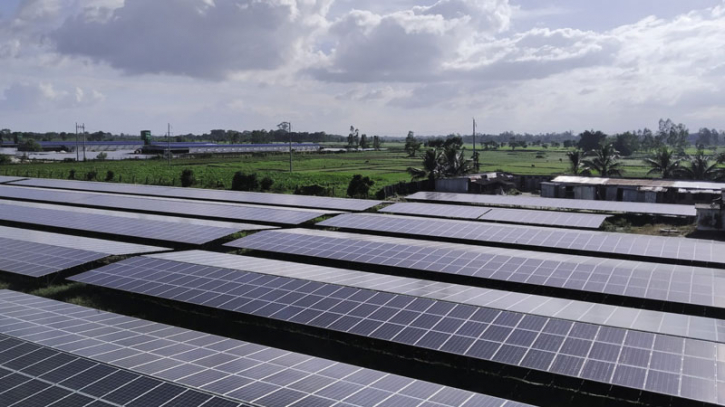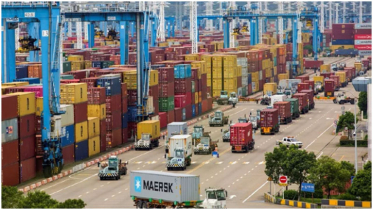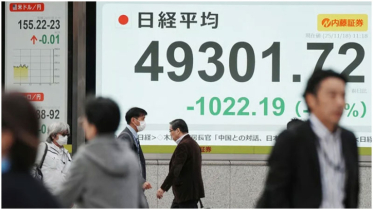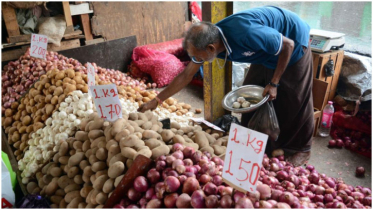BD govt speeds up 12GW green power projects, some with storage

The Power Division of Bangladesh is gearing up implementation of 125 green energy projects as it pursues a goal to meet 10% of the country's power needs from renewables by 2025.
The generation capacity of these projects will be 12,047 megawatts, more than the country's present demand in winter and 70% of summer time consumption, according to Power Division officials.
The projects will have seven solar power plants which will store 20% of the produced electricity for use during evening peak hours.
"We have received a large number of investment proposals in this sector from both domestic and foreign sources. In total, this will provide us with 11,000-12,000 megawatts of renewable energy," said Md Habibur Rahman, senior secretary of the Power Division.
Of the renewable energy projects 51 are ongoing and 74 are under process. About 90% of the plants will be solar-based and the rest are wind and waste-to-energy plants.
Currently, the country's electricity demand ranges from 8,000MW to 17,000MW depending on seasons. Generation capacity exceeds 26,000MW including imports and the share of renewables is less than 2%.
"We may not be able to meet our target of meeting 10% power needs from renewable energy by 2025," the Power Division senior secretary told The Business Standard. "However, it will increase significantly by 2027-2028. It may even reach 40% of our total power generation by then."
He further said, "It will take two to two and a half years to get electricity from the projects we are now approving. A significant amount of renewable energy-based electricity will be added to the national grid each year from now on."
This major transition to renewable power projects will ensure energy security in view of uncertain supplies and soaring costs of fossil fuels seen during the last few years, hopes the Sustainable and Renewable Energy Development Authority (SREDA) under the Power Division. Significant cut in carbon emission is another positive result of these projects.
Once implemented, these projects will help the government save billions in fuel cost for power generation.
Storing power for night
Among these projects, seven solar power plants will feed electricity to the national grid during daytime and store 20% of the generated electricity for feeding the grid when there is no sunlight, officials said.
Commercially, these types of power plants are the first to be established in Bangladesh, they said.
Many countries including India and Singapore have battery storage arrangements for solar power.
The secretary said the government is encouraging the establishment of solar-powered electricity projects equipped with storage capacity similar to other countries with the aim of getting supply from solar units in the evening or at night.
He said that solar storage has also been initiated in the country, with a 2-megawatt solar-powered electricity project established experimentally in Gazipur.
"Several proposals for projects including solar-powered electricity projects with storage capacity have been received from private sources. We will consider those positively as well."
Projects in progress
Currently, 10 operational solar power plants, both government and private, are contributing 461MW of electricity to the national grid.
Among ongoing projects in the private sector, the largest project is the establishment of a 1000MW solar power plant on Swarna Dweep in Noakhali by a US-based entity named ELERIS Ltd.
Other major projects include SAL-GTECH Consortium's 300MW solar power plant in Islampur of Jamalpur, and a 250MW solar-based power plant in Gangachhara of Rangpur, to be established through a joint venture of Shanghai Electric Investment Co Ltd (China) and Risen Energy (Hong Kong) Co Ltd.
Among the operational and under-construction power plants, 17 will generate electricity from wind, tidal, and biomass sources. These plants will have a combined electricity generation capacity of 933MW. The remaining 11,114MW of electricity will be from solar plants.
Seven under-construction renewable power plants will be equipped with battery storage systems. These plants will have a combined electricity generation capacity of 940 megawatts. Among them, five solar-based power plants, with a capacity of 740MW will be set up by Energon Renewables (BD) Ltd and PWR, two subsidiaries of the Orion Group through a joint venture in the private sector.
The joint venture will have solar-based power plants in Chattogram, Khulna, Mymensingh, Sherpur and Netrakona. The company will store 20% of electricity generated at each power plant, taking the total to 148MW to be stored in five plants.
Besides, ACWA Power, a Saudi-based company, is implementing a 300MW solar power project in Rampal of Bagerhat. Universal International Holdings Limited will set up a 200MW solar storage power plant in Sonagazi of Feni, and a consortium of Wuling Power Corporation Ltd and State Power Investment Corporation will establish a 100MW solar power plant with storage capacity of 20 megawatts in Goaland of Rajbari.
The current production capacity of 51 on-going solar energy projects in the government and private sectors is 3,748MW.
JT New Energy Company Ltd has undertaken a project to establish the largest wind power plant in the country in Chakaria of Cox's Bazar. The company will establish a 220MW wind power plant there.
Besides, three wind power plants, each with a production capacity of 100MW, are under process in Chittagong, Satkhira, and Patuakhali. Huiheng Wind Power Limited will invest in Bashkhali of Chittagong, Sustainable Energy International Ltd will invest in Satkhira, and a joint venture of HK Oasis Power Energy Development Co Ltd and Thien Vu Hybrid Power City Ltd will invest in Patuakhali.
Four biomass power plants are under process in Chittagong, Mymensingh, Brahmanbaria, and Rangpur. The combined production capacity of these plants is 64 megawatts. Besides, MA Green Energy Ltd will establish a 5MW biomass power plant in Pabna Sadar upazila.
10,000 acres of land to be required
To generate over 12,000MW of power from renewable sources, approximately 10,000 acres of land will be required. The government will implement the projects in areas near rivers, and sandy and barren lands.
The government estimates that to produce the equivalent amount of electricity from diesel-based power plants, the cost would be Tk2,64,000 crore. Similarly, the expenditure from gas-based power plants would be Tk24,000 crore, from coal-based power plants would be Tk1,20,000 crore, and from furnace oil-based power plants would be Tk1,68,000 crore.
Why solar power in Bangladesh costs more
In Bangladesh, the price of solar electricity is Tk11 or more per kilowatt which is significantly higher compared to other countries like India. When asked about the reason for that, the power secretary said in countries having deserts, the cost of land is lower, resulting in slightly lower rates there.
He said, "The reason for Bangladesh having higher tariffs compared to India is that in India, the government bears the cost of establishing transmission lines from power plants to the national grid. In our country, the respective companies have to build the transmission lines.
"Additionally, in many cases, we need to acquire land and construct retention walls. Due to these reasons, our rates here are slightly higher than those in India. However, if we exclude the cost of transmission lines, there is not much difference between the rates of Bangladesh and India."
In reply to a question of whether solar-powered projects would affect agricultural production, the secretary said, "Our policy is not to install solar power on agricultural lands. It is being implemented in areas near rivers, sandy lands – where there is either no cultivation or very minimum."
Source: The Business Standard.
.png)




